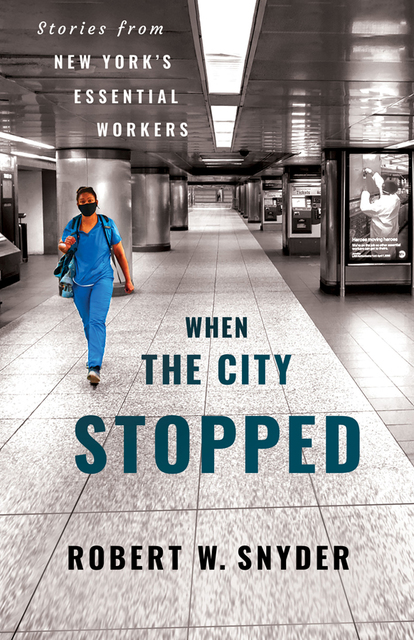When the City Stopped: Stories from New York’s Essential Workers
When the City Stopped: Stories from New York’s Essential Workers by Robert W. Snyder (Ithaca, NY: Cornell University Press, 2025)

“While the nightly cheers of the spring surge focused on health care professionals and first responders, there were other workers whose labor sustained the city that were almost invisible. Transit workers kept buses and subways running so that nurses and doctors could get to work at hospitals. Grocery store clerks and pharmacy staff kept the city supplied with food and medicine…much of the work that sustained the city was performed far from the limelight by immigrants, women, and people of color. The gap between recognition and suffering was particularly acute for transit workers…By the first week of April, forty-one transit workers were dead and thousands were sick…”
The forty-five oral history interviews that are compiled in this book were conducted by various COVID university projects at Fordham, Columbia, and the College of Staten Island. Robert W. Snyder, Manhattan Borough Historian and Professor Emeritus of American Studies and Journalism at Rutgers University, culled through mountains of sources (listed carefully in the Acknowledgments, Notes, and Contributors sections). They are organized both thematically and chronologically from early 2020 to the official end of the pandemic in 2023. The book is a treasure trove for current and future sociologists. What were the various ways people managed? Did certain jobs enhance community? How did people help each other?
Although Snyder found that the failures were endemic—not enough supplies, prep, honest information, backup plans, equipped hospitals (especially in lower income areas), and inadequate numbers of hospitals (vastly reduced since the 1975 fiscal crisis). He also concluded that New York was saved from the bottom up: people who provide service that is usually unappreciated—the cashier, the grade school teacher who had to teach children hygienic practices online without frightening them, the chef who had to close his 24-year beloved hangout that became unsustainable.
The story of the delivery bikers is especially illuminating in this regard. Even though they were acknowledged as essential workers who worked through the pandemic, the delivery companies (DoorDash, Uber Eats, Relay) that employed them treated them badly. They were banned from using restaurant restrooms, cheated them on tips and didn’t have health insurance. With help from the Workers Justice Project, a group of indigenous Guatemalan and Mexican couriers founded Los Deliveristas Unidos. On October 15, 2020, they demonstrated for their rights by riding down Broadway from the Upper West Side to City Hall. After more than a year of driver-led protests, rallies, and meetings with local legislators, the NY City Council passed legislation in September 2021 that codified the demands for better labor standards: a new minimum payment per delivery, tip and wage disclosures from the apps, free insulated bags for couriers, and the rights to set distance limits and use restaurant bathrooms.
Even a layperson’s perusal of this material reenforces the need to do better preparation and to start immediately. Society has forgotten about the 1918 flu that killed 30,000. The fact that 46,426 lives were lost in the city between March 2020 and June 2024 is an alert. We can learn from disasters—-i.e., build more hospitals, commit to health for all, educate at all levels, provide training, encourage careers, support science.
When The City Stopped will stimulate your brain, touch your heart, and nourish your compassion.
Marcia Newfield is a member of the Board of the New York Labor History Association. She is a retired BMCC Adjunct Lecturer in English and former VP for Part-Time Personnel at the PSC (Professional Staff Congress), the union for CUNY’s 33,000 faculty and staff.
